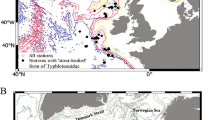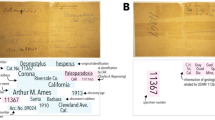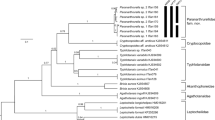Abstract
UNTIL recently, specimens of the strange deep-sea animals belonging to the group Pogonophora were known only from the Pacific. The first records were from Indonesia, and later on large samples were found by the Russians in the north-western part of the Pacific, and several species were described from this area. In 1956 I described some new finds from the eastern part of the Pacific, namely, from the Gulf of Panama, where they were taken by the Galathea 1. At the same time a description appeared of a new species, Siboglinum ekmani, by G. Jägersten2. This species was found in the Skagerrak, many miles from the earlier habitats. It was taken during the Skagerrak Expedition in 1933, but not identified until recently.
This is a preview of subscription content, access via your institution
Access options
Subscribe to this journal
Receive 51 print issues and online access
$199.00 per year
only $3.90 per issue
Buy this article
- Purchase on Springer Link
- Instant access to full article PDF
Prices may be subject to local taxes which are calculated during checkout
Similar content being viewed by others
References
Kirkegaard, J. B., Galathea Report, 2, 183 (1956).
Jägersten, G., Zoologiska Bidrag från Uppsala, 31, 211 (1956).
Author information
Authors and Affiliations
Rights and permissions
About this article
Cite this article
KIRKEGAARD, J. Records of the Group Pogonophora in the Skagerrak. Nature 181, 1086–1087 (1958). https://doi.org/10.1038/1811086a0
Issue Date:
DOI: https://doi.org/10.1038/1811086a0
This article is cited by
-
Pogonophora in the Hardangerfjord, Western Norway
Nature (1959)
-
Pogonophora from the Atlantic
Nature (1958)
Comments
By submitting a comment you agree to abide by our Terms and Community Guidelines. If you find something abusive or that does not comply with our terms or guidelines please flag it as inappropriate.



